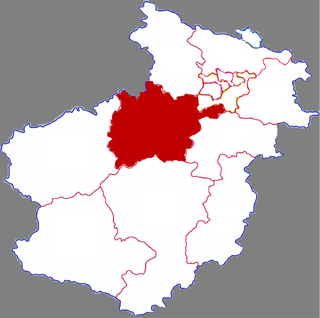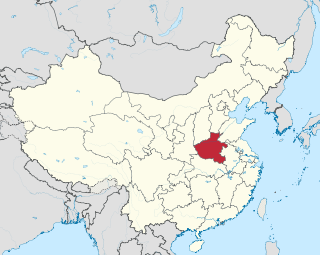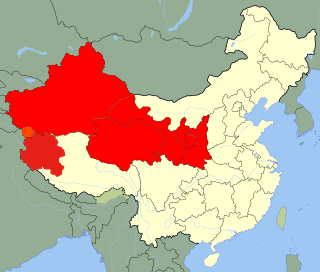
Zhang Zhen was a general of the People's Liberation Army of China and a member of the Central Military Commission of the Communist Party of China.
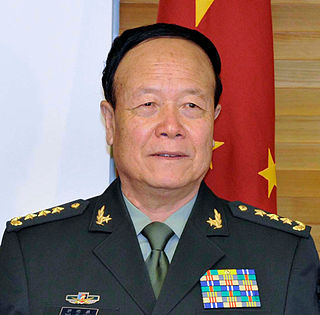
Guo Boxiong was a general of the People's Liberation Army of China. He served as the Vice Chairman of the Central Military Commission, China's top military council, between 2002 and 2012. During the same period he also held a seat in the Politburo of the Communist Party of China, China's top decision-making body. He was expelled from the Communist Party on 30 July 2015. On July 25, 2016, he was sentenced to life imprisonment for bribery.

Zhang Wannian was a general of the People's Liberation Army (PLA) of the People's Republic of China.
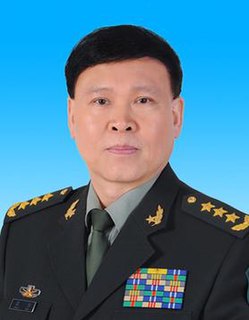
Zhang Yang was a general in the Chinese People's Liberation Army (PLA) who served as Director of the Political Work Department. He was previously political commissar of the Guangzhou Military Region. He committed suicide.
Zhang Haiyang is a retired general in the People's Liberation Army (PLA) of China, who served as political commissar of the PLA Second Artillery Corps.
Gu Junshan is a former lieutenant general in the People's Liberation Army (PLA) of China who was sentenced to prison for corruption. He served as the Deputy Director of the PLA General Logistics Department (GLD) from December 2009 to February 2012. During his tenure he oversaw the consolidation and sale of military real estate assets. Prior to that, he served as the chief of the barracks and housing division of the GLD, in charge of upgrades to the facilities and residences of army personnel.
Gao Xiaoyan is a disgraced major general in the People's Liberation Army of China. She successively served as Political Commissar and Discipline Inspection Secretary of the PLA Information Engineering University in Zhengzhou, and Executive Director of China Institute For Leadership Science (CILS). Investigated by the PLA's anti-graft agency in December 2014, She was the first female general to have been implicated in the anti-corruption campaign launched after the 18th Communist Party Congress.
Liu Zheng is a former lieutenant-general in the People's Liberation Army of China. He served as Deputy Head of the PLA General Logistics Department. In November 2014 he was placed under investigation by the PLA's anti-corruption agency.
Zhang Qibin is a former major general in the People's Liberation Army of China. In August 2014 he was placed under investigation by the PLA's anti-corruption agency. Previously he served as Deputy Chief of Staff of the Jinan Military Region, one of seven military districts located in the east of China.
Zhang Daixin is a general in the People's Liberation Army of China. Zhang holds the rank of major general in the PLA. He was investigated by the PLA's anti-graft agency in December 2014. Zhang served as Deputy Commander of Heilongjiang Military District from 2012 to 2014, previously he was the director of the Logistics Department of the 16th Army.
Fan Changmi is a former lieutenant-general of the People's Liberation Army of China. In December 2014, he was under investigation by the PLA's anti-corruption agency. He served as Deputy Political Commissar of the Lanzhou Military Region, one of the seven military regions in China, but was placed under investigation for corruption in 2014.
Du Jincai is a retired general of the People's Liberation Army who served as Secretary of the Commission for Discipline Inspection of the Central Military Commission. He was also Deputy Secretary of the Central Commission for Discipline Inspection (CCDI), and a member of the CCDI Standing Committee.
Zhou Minggui is a Chinese major general in the People's Liberation Army. He earned the rank of Major General in July 2007. He was Deputy Director of the Political Department of Nanjing Military Region before he was placed under investigation by the PLA's anti-corruption agency. In May 2015, he was transferred to the military procuratorates.
Deng Ruihua is a Chinese major general in the People's Liberation Army. He served as Political Commissar of the Joint Logistics Department of Lanzhou Military Region from April 2010 to March 2014. On July 10, 2015, the PLA announced that he has been transferred to the military procuratorates.
Liu Lei is a general of the Chinese People's Liberation Army (PLA). He has been Political Commissar of the PLA Ground Force since December 2015, and formerly served as Political Commissar of the Lanzhou Military Region and the Xinjiang Military District.
Zhan Guoqiao is a major general in the People's Liberation Army (PLA). As of December 2014 he was under investigation by the PLA's anti-corruption agency. He was transferred to the military procuratorates in March 2015. In August 2015, he was removed from membership of China's top parliamentary body, the National People's Congress.
Zhou Guotai is a former major general of the Chinese People's Liberation Army, and former director of Research and Development Center for Security and Protection of Tsinghua University. Zhou is also a fellow of the Chinese Academy of Engineering. He has been hailed as "father of China's bulletproof vest".
Liu Zhanqi is a former officer of the Chinese People's Armed Police. He was investigated by the Commission for Discipline Inspection of the Central Military Commission (CMCCDI) in November 2014 and his case was handed over to military prosecutors in May 2015. Previously he served as chief of the People's Armed Police traffic command.
Zhang Yun is a Chinese economist and banker who served as president of Agricultural Bank of China (ABC) from January 2009 to December 2015. He had also served as vice-president and deputy party chief of the bank. In November 2015 he was taken away by the anti-graft authorities. He spent over 30 years working at the bank and was appointed vice-chairman, president and deputy secretary of the Party committee at the bank in 2009. Zhang Yun is so far the most high-profile bank executive in China caught since Communist Party General Secretary Xi Jinping's continues an anti-graft dragnet at all levels of government, military and ruling Communist Party. His predecessor, Xiang Junbo, was also sacked for graft.
Zhang Shengmin is a general of the Chinese People's Liberation Army Rocket Force. He is a member of the Central Military Commission (CMC) and Secretary of the CMC Commission for Discipline Inspection. He is also a Deputy Secretary of the Central Commission for Discipline Inspection, the top anti-corruption agency of China.


